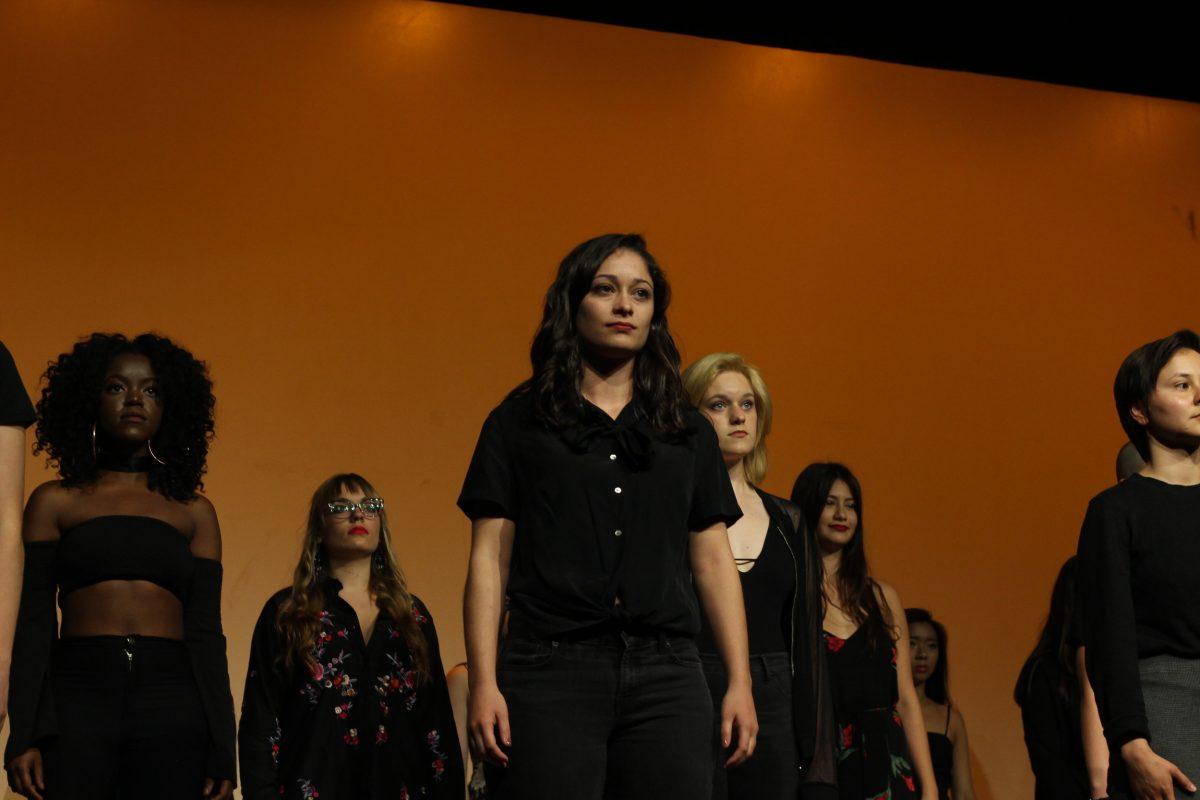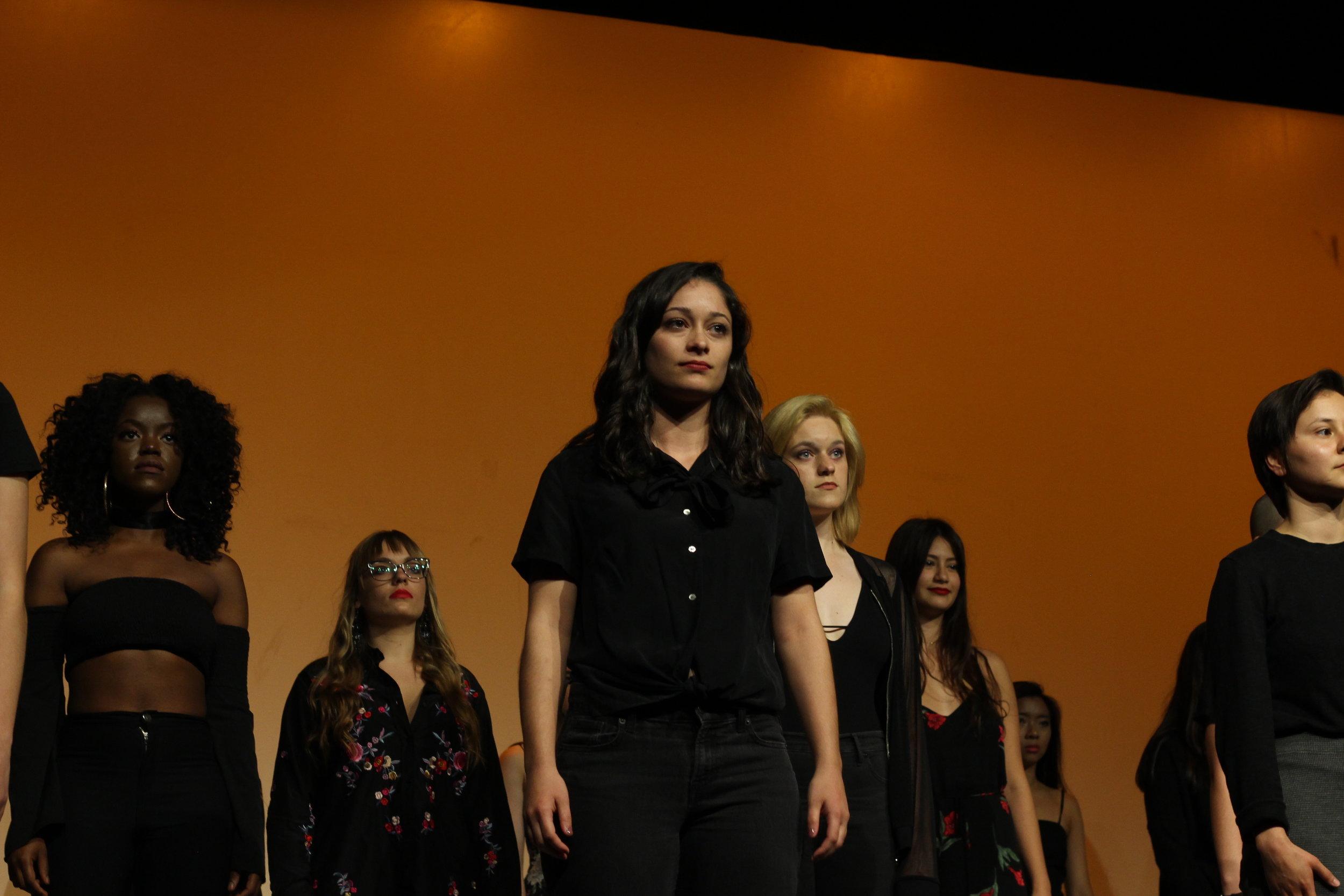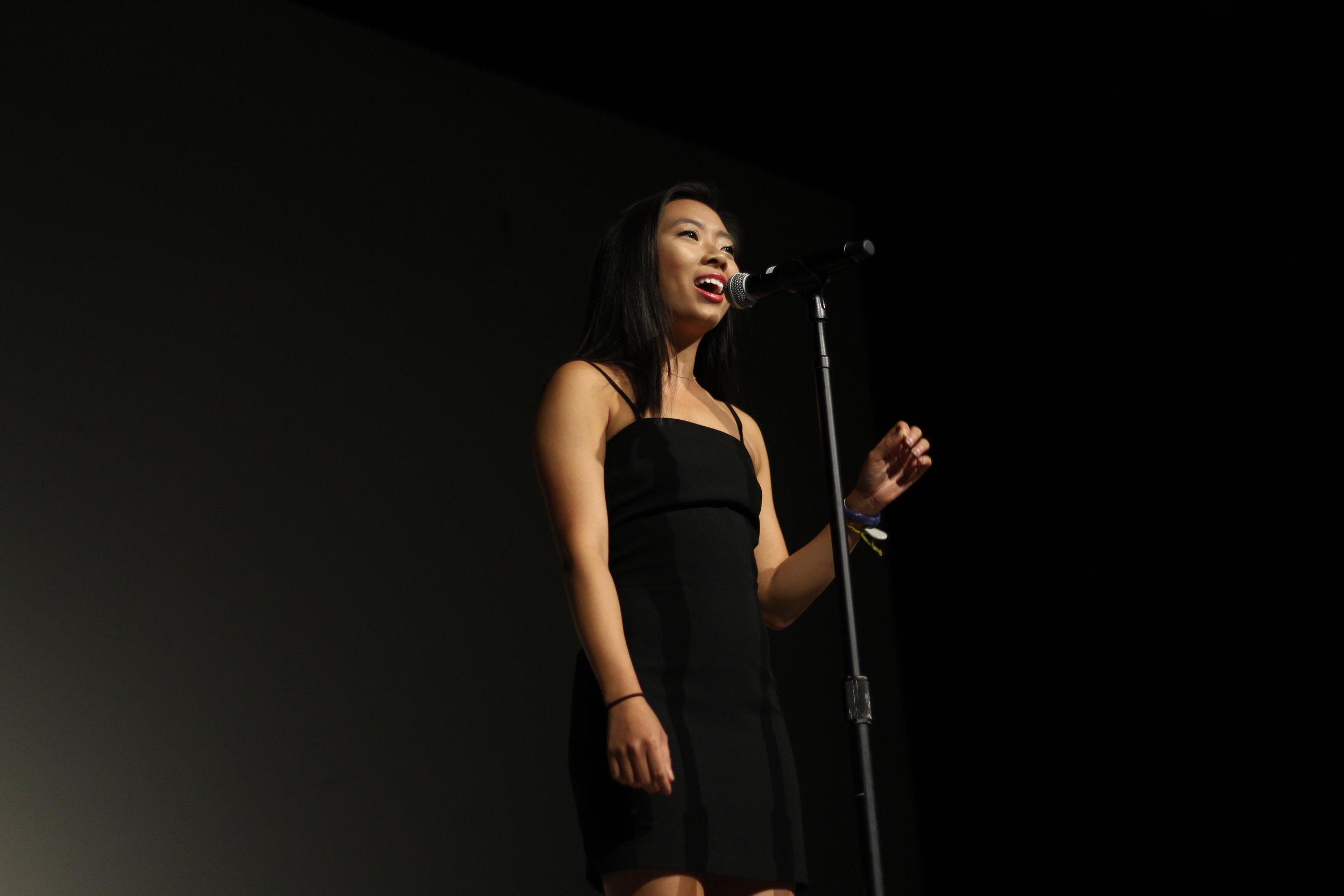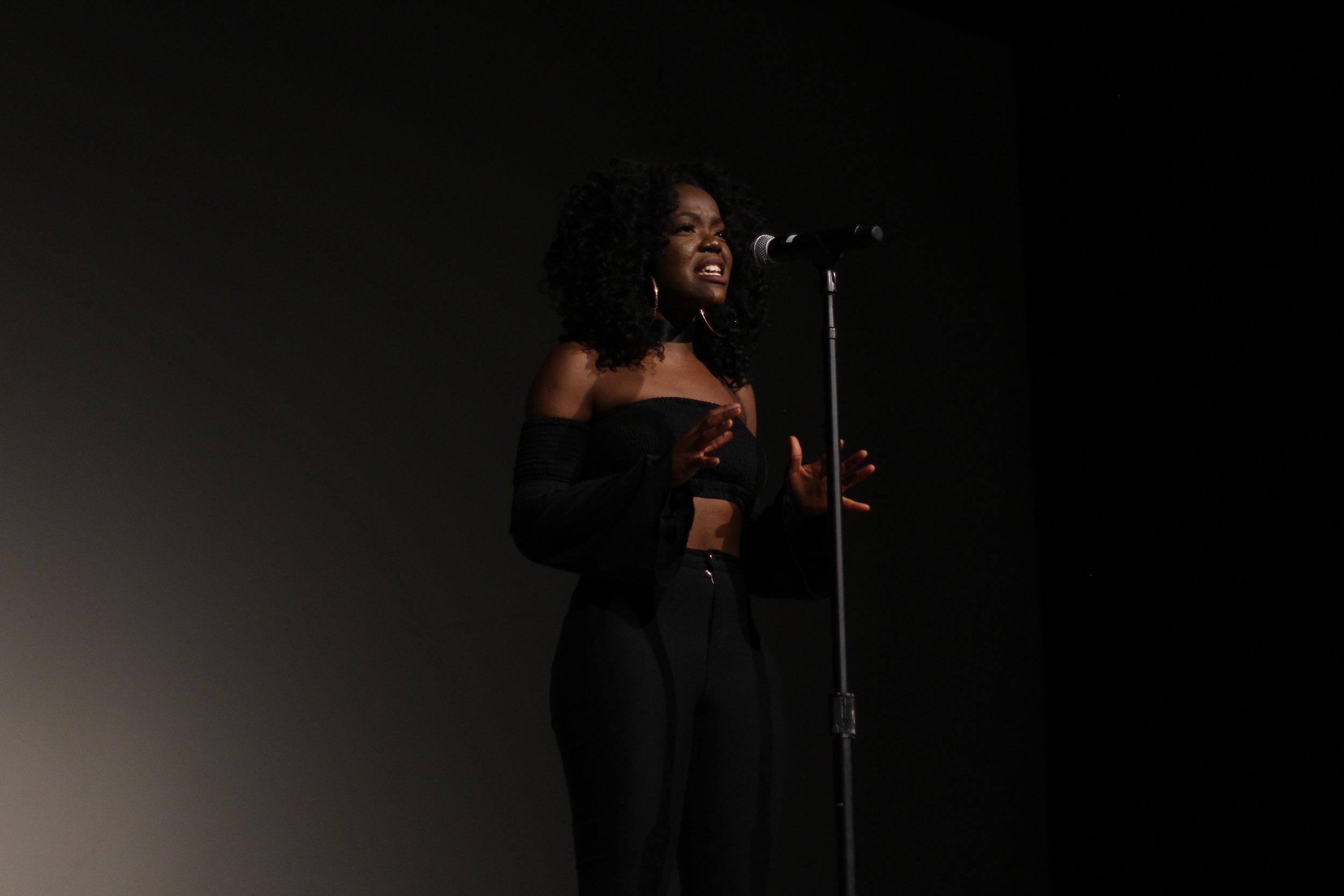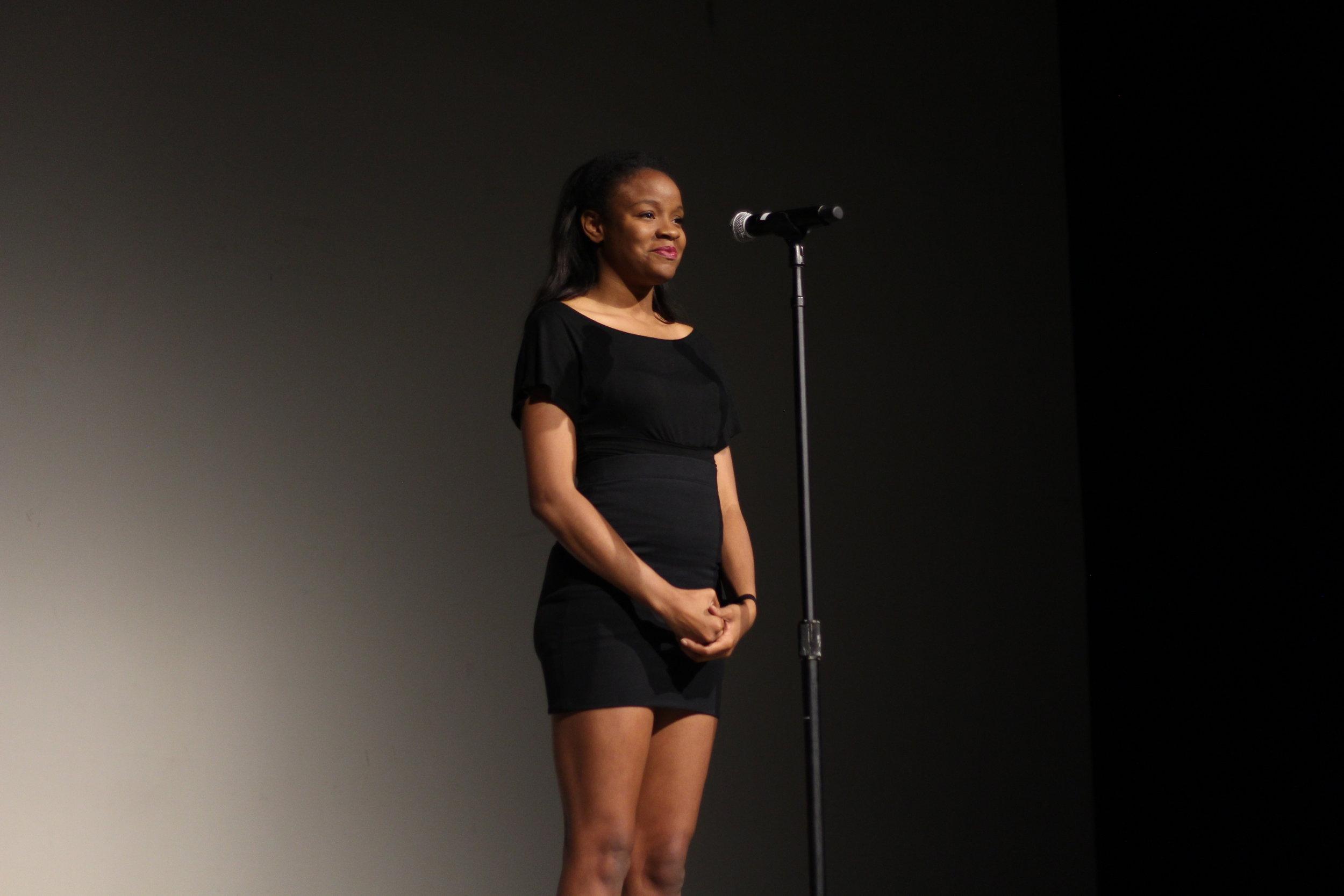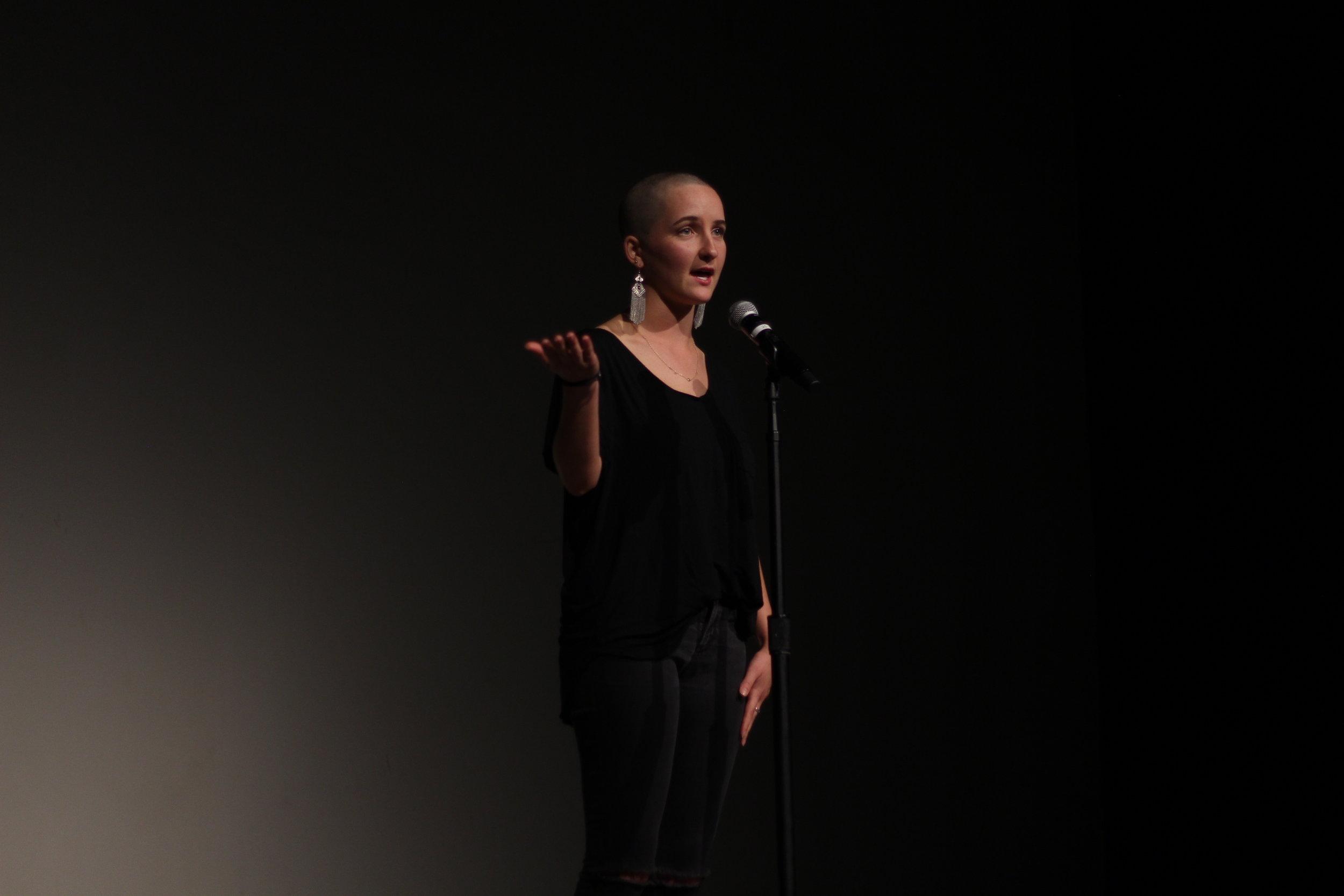From left to right: Siji Deleawe, Jada Fraser, Liz Schasel, Alexandria Wagner, Emily Mackay, Paulina Kuo and Lily Gonzales
Over 30 University of Texas at Austin students stand together on the Union stage to amplify the heartbreaking, joyous and empowering stories of women-identifying students. The “Amplify: UT Women’s Voices 2018” production left the crowd crying, laughing and hoping for a better future for women on campus.
Story by Libby Cohen
Photos by Alissa Jae-Lazo Kim
Amplify began two years ago when the Women’s Resource Agency came together to provide a platform for women-identifying students to share their stories. In addition to its inclusive platform, Amplify serves as a fundraiser for Voices Against Violence Survivors’ Emergency Fund. This charity supplies financial aid to students impacted by sexual harassment. In order to represent this philanthropy in an appropriate way, the WRA wants to pass the microphone to highlight different walks of life, so that all voices can be heard. This year’s performances exemplify this goal.
As the lights dim in the Union Theater, images of prominent women rotate on a large screen. Chloe Kim, Natalie Portman and Michelle Obama are just a few examples of women who use their platforms to progress women’s rights. With this positive perspective in the minds of the audience, the tone of the video presentation changes.
The covers of various newspapers flash one after another, depicting setbacks of the past year. From the workplace to the soccer field, Amplify clarifies that although 2018 is bringing progress, there are also major problems that still exist today, such as the gender pay gap and norms surrounding sexual assault and rape culture.
As the video presentation ends, Layla Wehbe, a fourth year public relations major and one of the show’s producers, steps into center stage. One of the biggest challenges the producers face is equally representing all students that identify as women. Wehbe explains they wanted to be as inclusive as possible but had to rely on the submitted stories. Addressing the audience, she says that while not every voice is represented in the show, the cast hopes to amplify their stories.
The remainder of the production showcases 26 speakers addressing different topics, including women in the workplace, body image, women of color, stereotypes, mental health, the LGBTQIA+ community and interpersonal violence. “This year, we added a category about women in the workplace because of events which I think were very impactful, and a platform that was desperately needed,” Wehbe says. “As students, many of us hope to enter male-dominated fields and we provided a platform for UT women to grapple with the challenges and frustrations that come with that”.
Paulina Kuo speaks about being a woman pursuing STEM.
Some of the performers present monologues written by others who chose not to perform, while others recall events and memories of their own. In either case, each speaker performs with such eloquence and strength that every spoken word hits the audience in a different, yet impactful way. Although each story contains a certain gravity worthy of further analysis, the following performances spark an array of emotions and collectively encompass the night’s mission.
“My name is Paulina and I am a woman in computer science.” Paulina Kuo, a third-year computer science major, stands in the middle of the stage as she explains the everyday struggles women experience in STEM fields. She recalls comments made by her peers and even potential bosses that contribute to what she sees as another industry leaving women behind. Kuo further explains how the lack of gender diversity creates even more consequences, as male engineers often remain focused on technology intended to support men. “As students, many of us hope to enter male-dominated fields and we provided a platform for UT women to grapple with the challenges and frustrations that come with that,” Wehbe says.
Focusing on the future, Kuo poses a question to the audience: “What would technology be today if men and women partnered at the forefront of innovation?” Her father, Jack Kuo, says Kuo’s involvement brings attention to the UT classroom dynamic that consists of her, a few other women computer science students and hundreds of male students. At the end of her fast paced, comical speech, she says, “This is not to say all women need to study computer science. This is to bring (attention to) generations of stigma saying that we can’t.”
Siji Deleawe speaks about her experience being a black woman on campus.
Siji Deleawe, a second year Plan II and business honors double major, takes the audience to a different issue on UT’s campus, specifically regarding women of color. Yet, just as Paulina’s optimism peaked in her performance, Deleawe sees a future where women of color will feel safe on UT’s campus. “We are here tonight, speaking up now, so that perhaps one day in the not-so-distant future, we might not have to scream so loud just to be heard,” she says.
Kelly Nwonuma, a fourth year corporate communications major, performs “Murder by Blackness”, a piece written by Lauren Bell, a third year English, African-American studies and women and gender studies major, intending to shed light on the othering of women of color in the classroom. While presenting to the audience, Nwonuma says, “The less I’m noticed, the less I have to explain myself — explain why I’m here.”
To discuss what it feels like to be apart of a demographic group that only takes up five percent of UT’s student body, she explains the feeling of being black in a predominantly white space. “I spend the next 45 minutes proving my worth to a class of peers that do not believe I deserve to be here,” she says.
Kelly Nwonuma performs a monologue written by Lauren Bell.
Although snapping is meant to cause less disruption, the audience could not help overcoming the entire theater with just a small movement of their fingers. Just as Kuo ended her speech with hope for the future, Nwonuma says, “Today I am invisible. But someday, and someday soon, I will stand up, I will shine and I will express my blackness as the gift that it is meant to be. As the gift that it is.” Snaps.
The rest of the night is an emotional rollercoaster. Women-identifying students lay out the nuances and inner workings of topics ranging from their first girlfriend to sexual abuse. Briana Torres, a third year Plan II honors and English major, recounts an anonymous story that happens far too often on college campuses. She details the night a UT student was assaulted in her own home, by her own friend. Amplify gave this survivor a chance to share a story she kept secret for four years. She writes, “I wish I could say my story is unique. I wish I could say it’s rare, but it’s not.”
A sad truth is that two-thirds of sexual assaults are not reported to the police.
Amplify resembles the progress and setbacks made thus far for women’s rights. By providing a platform, the performers brought attention to voices often ignored on campus. Even through the stories that brought tears to eyes, women-identifying students strengthened each other through the power of storytelling.
Annie Teer performs “Womanhood.”
“I want to write a poem about radical solidarity taking shape in all of the strangers that have ever given me a tampon, all of the best friends that I’ve made in bar bathrooms, all of the strong and fearless women, politicians and family members, celebrities and friends, that pushed me everyday and in every way to prove the world wrong,” Annie Teer, a second-year social work major, says in her performance “Womanhood”.































